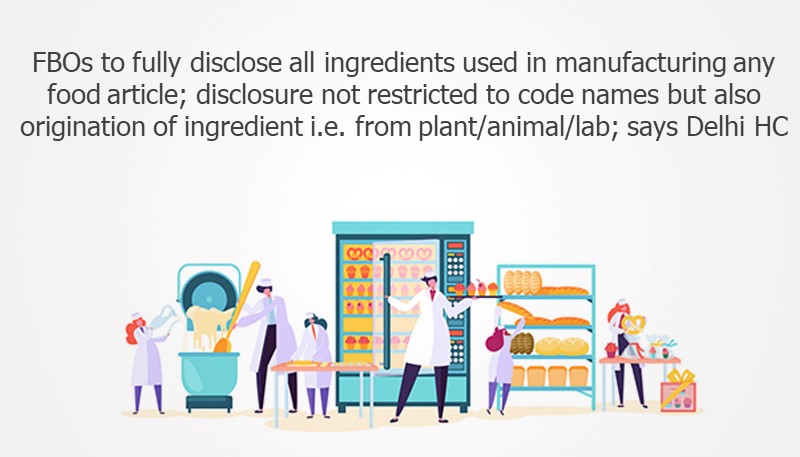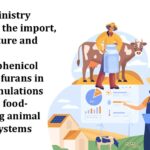In Ram Gaua Raksha Dal (“Petitioners”) Vs. Union of India and Ors. (“Respondents”), the Delhi High Court (“Court”) has directed Food Business Operators (FBOs) to make “full and complete disclosure” of all the ingredients which go into the manufacture of any food article, not only by their code names, but also, by disclosing whether they originate from plant, or animal source, or whether they are manufactured in a laboratory, irrespective of their percentage used in the food article. Further, the Court issued a notice directing the same to the Central Government and the Food Safety and Standards Authority of India (FSSAI).
Facts of the Case:
- The Petitioner trust adheres to the tenets of Namdhari religion, a sect of Sikhism stated that they consider cows to be sacred and even the very idea of harming them in the slightest bit is considered abhorrent. The petition further stated that, it is the Fundamental Right of any citizen to know whether or not the food they consume, cosmetics and perfumes they use, clothes/garments they wear, contain, or are manufactured by using, components or parts derived from the body of an animal and many a times animal by-products are squeezed into products these days and are given misleading names for the sake of their marketability.
- The petitioner stated that non-disclosure on the part of the manufacturers is a violation of the following articles of the Indian Constitution:
- Article 25 of the Indian Constitution, which protects for all persons their Fundamental Right to freedom of conscience and the right to freely profess and practice their religion;
- Article 21 of the Indian Constitution which guarantees every citizen the Fundamental Right to protection of Life and Personal Liberty;
- Article 19(1)(a) of the Constitution of India, which grants the citizens of India the fundamental right of full disclosure of the components of products and commodities and
- Section 2 (9) (vi) of the Consumer Protection Act, 2019 which includes the right to consumer awareness under “consumer rights”.
- Along with this, the petition also stated that since “veganism” has become a global trend, it is important to create opportunities available to people to be able to decide for themselves, the principles they would follow in their lives instead of being made to live a life by default.
- The Petitioner requests for mandating manufacturers to label their products according to the nature of the ingredients and based on the items used during its manufacturing processes and also for setting up an Expert Committee to examine the feasibility of labeling all items that are used by consumers, to be labeled as vegetarian and non-vegetarian products.
The Delhi High Court in this matter observed that “Every person has a right to know as to what he/ she is consuming, and nothing can be offered to the person on a platter by resort to deceit, or camouflage”.
Thus, in its order dated 9th December 2021, the Court held that, even if the usage of animal ingredients constitutes “a miniscule percentage,” “the use of non-vegetarian ingredients would render such food articles non-vegetarian, and would offend the religious and cultural sensibilities/ sentiments of strict vegetarians, and would interfere in their right to freely profess, practice and propagate their religion and belief “. Thus, it is mandatory for all Food Business Operators and regulatory authorities to strictly comply with this matter and ensure “full and complete disclosure of all the ingredients which go into the manufacture of any food article “.
Failure on the part of the FBOs to comply with the above requirements would expose them to class action for violation of the fundamental rights of the consuming public and invite punitive damages, apart from prosecution.
Source: Delhi High Court





